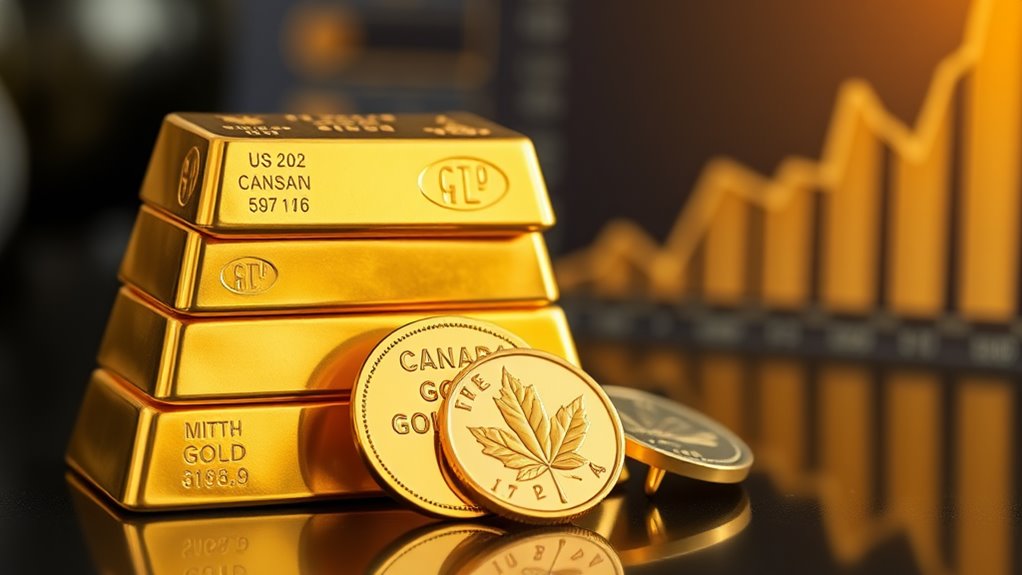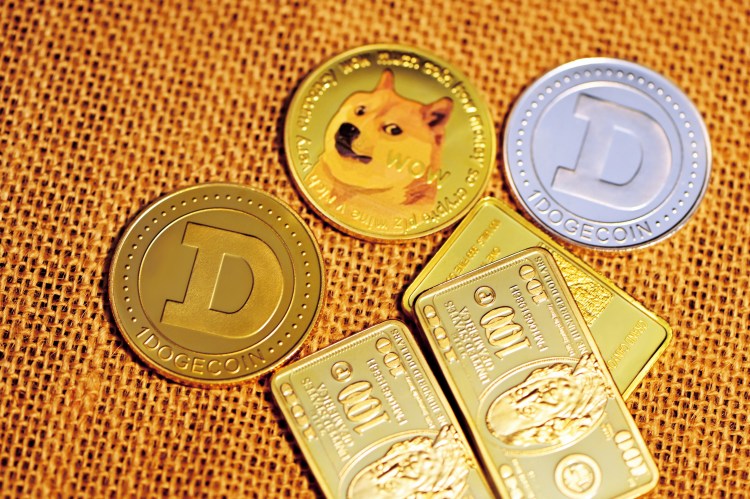Understanding Gold Bullion
Note: This post may contain affiliate links, and we may earn a commission (with No additional cost for you) if you make a purchase via our link. See our disclosure for more info. The crypto world is constantly changing. This content is for informational purposes only and not financial, legal, or professional advice So, please verify the info on the cryptocurrency provider’s websites.
Gold bullion isn't just fancy metal; it's pure gold, at least 99.5% pure, to be exact. Available as bars, coins, or rounds, it's valued for its content, not looks. Gold's liquid. You can sell it quickly when needed. It's a solid hedge against inflation and the economy's tantrums. But beware, fakes are everywhere, so check for serial numbers. Stick around, and you'll get the full scoop on what makes this yellow metal a top investment choice.

Gold bullion isn't just shiny metal; it's a serious investment vehicle. When people think of gold, they might picture a gleaming necklace or a fancy bracelet. But here's the deal: gold bullion is all about that pure, unadulterated metal, often flaunting a purity of 99.5% or higher. Forget the sparkles; we're talking bars, coins, and ingots here, valued strictly for their metal content. No frills, no decorative nonsense.
There are various forms of gold bullion. Bars can weigh anywhere from a tiny 1 gram to a hefty 400 ounces. Coins? Think government-minted beauties like the American Eagle or the Canadian Maple Leaf. They're legal tender, but let's be real—they're worth their weight in gold, literally. Rounds are another option, privately minted with no face value, often lighter on the wallet than coins. All of these types are recognized internationally for their liquidity and standardized weight and purity. Modern investors can now access gold's stability through digital gold tokens that are backed by physical reserves, combining traditional value with technological convenience.
Gold bullion comes in various forms—bars, coins, and rounds—each with unique appeal and recognized value worldwide.
Now, purity is a big deal. It's measured in fineness or karats. A 24k gold piece? That's 99.9% pure. The weight? Measured in troy ounces, which is a fancy way of saying, "not your average ounce." Bars come with serial numbers and refinery stamps, making them as official as your high school diploma. Gold bullion is often produced by accredited refineries, ensuring authenticity and quality in the production process.
Investing in gold bullion can be a smart move. It diversifies portfolios and can act as a hedge against inflation. When the economy tanks, gold tends to hold its value. Plus, it's liquid—meaning you can easily swap it for cash when needed.
The production process? It's pretty wild. Raw gold gets refined and melted down, then shaped into all those shiny forms. They even have anti-counterfeiting measures, because who doesn't want to avoid fake gold?
In a world where market dynamics are ever-changing, gold bullion remains a stalwart. It's not just a shiny trinket; it's a serious player in the investment game.
Frequently Asked Questions
How Is Gold Bullion Priced in Different Markets?
Gold bullion pricing differs wildly across markets.
It's all about supply and demand, folks. You've got spot prices for immediate sales and futures prices, which are basically bets on future delivery.
Add in central bank antics and dollar strength, and voilà! Prices shift.
Premiums? Yeah, those vary too. Coins cost more than bars, all thanks to demand and production costs.
Local taxes and storage fees? Just more fun in the gold game.
What Are the Different Forms of Gold Bullion Available?
Gold bullion? It's pretty straightforward.
Mainly, you've got gold bars and gold coins. Bars come in cast, minted, and even combi styles—because why not complicate things?
Coins? They're often legal tender, available in various sizes and purities. Think Gold Eagles or Maple Leafs.
And don't forget about investment factors—premiums, storage woes, and taxes lurking in the background.
Oh, and there are ingots and rounds too. Just more shiny options.
Can Gold Bullion Be Used as Collateral for Loans?
Gold bullion? Yes, it can be used as collateral for loans. Sounds fancy, right?
But don't get too excited. Lenders love it because it's liquid and stable. But hold on! There's volatility too, which could bite back. You could lose your shiny treasure if you default.
Plus, no income from that gold—just sitting there, doing nothing. So, is it worth it? Depends on your situation.
Just remember, it's not all glitz and glam.
What Are the Tax Implications of Buying Gold Bullion?
Buying gold bullion? Hold onto your wallet.
Gains over a year? Bam! A hefty 28% capital gains tax slaps you.
Got legal tender coins? Lucky you! They dodge that collectible tax if in an IRA.
Short-term gains? Yeah, they get taxed like your regular income—ouch.
Inherited gold? Market value at death, thank you very much.
Remember: taxes can be a real party crasher in the gold game. Keep your eyes peeled!
How Do I Authenticate Gold Bullion Before Purchasing?
Authenticating gold bullion? It's a must before shelling out cash.
Start with physical tests: a magnet won't lie, so get that out. Use size and weight comparisons, too. Sound tests? Sure, they can be revealing.
Move on to chemical tests, like the classic acid test or the ceramic test. Feeling fancy? Try advanced methods like X-ray fluorescence.
Verify with documentation. Don't get duped by shiny rocks; know what you're buying!










